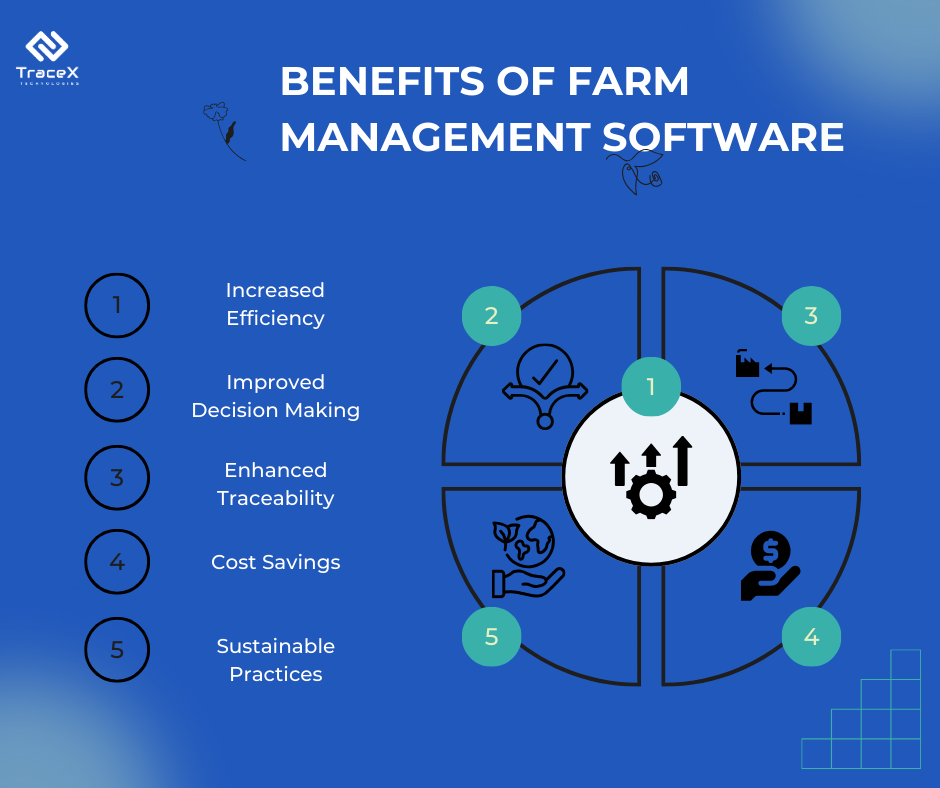Contact: +91 99725 24322 |
Menu
Menu
Quick summary: Explore the digital platforms revolutionizing farm management in the Philippines. Discover how technology solutions are empowering farmers, enhancing productivity, and driving sustainability in agriculture.

The integration of digital platforms in farm management is transforming traditional farm management practices in the vibrant agricultural landscape of the Philippines. With the advent of advanced technologies, Filipino farmers are gaining access to powerful tools that revolutionize their approach to cultivation, resource management, and market access.
Based on the 2021 figures from the Philippine Statistics Authority (PSA), individuals engaged in farming and fishing continue to face significant poverty rates in the nation. The poverty incidence among farmers stands at 30%, nearly double the national average of 18.1% reported by the World Bank.
From remote sensing and precision agriculture to supply chain traceability and market intelligence, these digital platforms offer a plethora of solutions tailored to the unique challenges and opportunities faced by farmers across the archipelago. Join us as we delve into the exciting world of digital agriculture and explore how these platforms are reshaping the future of farming in the Philippines.
Digital platforms in modern farm management refer to online tools and technologies that streamline and optimize various agricultural processes. These platforms provide farmers with tools for monitoring crop health, managing resources, tracking equipment, and analyzing data to make informed decisions. The significance lies in their ability to enhance efficiency, increase productivity, and promote sustainable farming practices. Digital platforms offer real-time insights, enabling farmers to respond promptly to changing conditions, optimize resource use, and improve overall farm performance. These tools play a crucial role in modern agriculture, contributing to precision farming, data-driven decision-making, and ultimately fostering more sustainable and resilient farming practices.
The agricultural landscape in the Philippines is undergoing significant changes, driven by various factors. Despite being a crucial sector for the economy, agriculture faces challenges such as land fragmentation, outdated farming practices, and vulnerability to climate change. Efforts are underway to modernize the sector through technology adoption, promoting sustainable practices, and enhancing farmers’ access to markets. Government initiatives and collaborations with the private sector aim to improve infrastructure, provide financial support, and strengthen the value chain. The Philippines’ evolving agricultural landscape reflects a growing awareness of the need for innovation, resilience, and sustainability to ensure food security and economic development in the face of ongoing challenges.
The challenges faced by Filipino farmers are multifaceted and deeply entrenched, posing significant obstacles to their livelihoods and well-being.
In the Philippines, postharvest losses among major farm commodities range from 10-50%.
Addressing these challenges requires comprehensive strategies that encompass financial support, infrastructure development, climate resilience measures, and market access initiatives. Embracing innovative technologies and sustainable practices can also play a crucial role in enhancing the productivity, efficiency, and profitability of Filipino farmers.
Technology solutions play a pivotal role in addressing the multifaceted challenges faced by Filipino farmers. Digital innovations offer transformative opportunities to enhance agricultural productivity, efficiency, and sustainability. For instance, precision agriculture technologies enable farmers to optimize resource use, minimize input costs, and maximize yields through data-driven decision-making. Automated systems and robotic technologies streamline labor-intensive tasks, reducing reliance on manual labor and increasing operational efficiency. Improved crop rotation practices and diversified crop production strategies mitigate the impacts of climate change by promoting crop resilience and adaptation. Furthermore, innovative inventory management systems and enhanced marketing strategies facilitate market access for small-scale farmers, enabling them to reach broader markets and command better prices for their produce. Overall, technology solutions empower Filipino farmers to overcome financial constraints, improve postharvest practices, adapt to climate change, and access markets more effectively, thereby fostering a more sustainable and prosperous agricultural sector.
Discover how innovations like precision farming, IoT sensors, and AI-driven analytics are transforming crop cultivation.
Dive into the cutting-edge agricultural technologies for crop management.
Precision agriculture plays a pivotal role in optimizing resource use by leveraging technology to enhance efficiency and sustainability in farming. Through the use of advanced tools like GPS-guided tractors, drones, and sensors, farmers can precisely target inputs such as water, fertilizers, and pesticides, minimizing waste and environmental impact. Data-driven insights from precision agriculture enable farmers to tailor their practices to specific field conditions, improving crop yields and reducing resource usage. This approach not only enhances productivity but also contributes to environmental stewardship, making precision agriculture a key strategy in the sustainable and efficient management of resources in modern farming.
Several tools facilitate real-time crop monitoring and management in modern agriculture. Satellite imagery platforms like Planet and Sentinel provide up-to-date visuals of fields, enabling farmers to assess crop health, detect anomalies, and plan interventions. IoT devices such as soil sensors and weather stations, integrated into systems like CropX and Davis Instruments, offer real-time data on soil moisture, temperature, and weather conditions. Additionally, farm management software like FieldView and FarmLogs aggregates these data points, providing a comprehensive view for informed decision-making. These tools collectively empower farmers with real-time insights, optimizing crop management practices and contributing to enhanced agricultural productivity and sustainability.
The integration of weather forecasting tools is a critical component for risk mitigation in agriculture. By incorporating advanced weather prediction technologies into farm management systems, farmers can anticipate and respond to changing weather conditions. This enables them to adjust planting and harvesting schedules, optimize irrigation plans, and take preventive measures against extreme weather events. Accurate weather forecasts, integrated into precision farming platforms, contribute to proactive decision-making, reducing the impact of adverse weather on crops. This integration serves as a key risk mitigation strategy, enhancing the resilience of agricultural operations and ensuring more effective resource allocation for sustainable farming practices.
Digital platforms play a crucial role in connecting farmers to the broader agricultural supply chain. Through online marketplaces and farm management systems, farmers gain direct access to buyers, distributors, and other stakeholders. These platforms facilitate efficient communication, streamline transactions, and provide transparency in the supply chain. Farmers can showcase their products, negotiate prices, and ensure timely delivery, fostering a more direct and collaborative relationship with the larger agricultural ecosystem. This connectivity enhances market access, improves efficiency, and contributes to the overall modernization of the agricultural supply chain, benefiting both farmers and the broader industry.
Farm Management platforms streamline the management of seeds, fertilizers, and pesticides in agriculture. Farm management software and precision agriculture tools enable farmers to track inventory levels, monitor usage, and optimize application rates. These platforms offer real-time data on soil conditions and crop health, allowing for precise decision-making regarding the timing and quantity of inputs. By centralizing this information, farmers can efficiently plan and manage their resources, minimizing waste and improving overall operational efficiency. The integration of digital solutions in input management contributes to sustainable farming practices by ensuring judicious use of essential resources and enhancing productivity.

Mobile applications connecting farmers and stakeholders offer a transformative approach to agriculture. These apps serve as digital platforms facilitating communication, information sharing, and transactions between farmers, buyers, and other stakeholders in the agricultural supply chain. They provide features like marketplaces for buying and selling produce, real-time weather updates, agricultural advice, and financial services. These applications bridge gaps, enhance efficiency, and empower farmers by providing them with direct access to markets and valuable resources, contributing to the modernization and sustainability of the agricultural sector.
TraceX farm management solutions offer a comprehensive suite of tools and capabilities designed to empower Filipino farmers in addressing their challenges and transitioning to sustainable agriculture practices. Firstly, it provides digital platforms for farm-level digitization, enabling farmers to streamline their operations, optimize resource use, and enhance productivity. Through real-time data capture and monitoring, farmers can make informed decisions about input usage, crop management, and pest control, thus reducing reliance on costly inputs like fertilizers and pesticides. Additionally, TraceX facilitates communication and collaboration between farmers and agricultural experts, enabling access to agronomic advisory services, training programs, and market information. This promotes knowledge sharing and capacity building among farmers, empowering them to adopt sustainable farming techniques and improve their livelihoods. Furthermore, the platform offers end-to-end traceability solutions, leveraging blockchain technology to ensure transparency and accountability throughout the supply chain. By providing visibility into the origin and quality of agricultural products, it helps farmers command premium prices for their produce and access lucrative markets. Overall, TraceX farm management solutions play a crucial role in facilitating the transition to sustainable agriculture practices by equipping Filipino farmers with the tools, knowledge, and resources they need to thrive in a rapidly changing agricultural landscape.
Explore the impactful collaboration between TechnoServe and TraceX in the ‘Sustainable Livelihoods for Smallholder Farmers’ program.
Discover how this partnership has elevated coffee quality, increased farmer incomes, and fostered socio-economic and environmental advantages.
Dive deeper into the case study now.
The adoption of digital farm management faces several common challenges. Limited access to technology, especially in remote areas, poses a barrier for some farmers. Resistance to change and a lack of digital literacy among farmers can slow down the adoption process. Cost considerations, both in terms of initial investment and ongoing expenses, can be challenging for smaller farms. Interoperability issues between different digital tools and platforms may also hinder seamless integration into existing farming practices. Overcoming these challenges requires targeted efforts in providing education, ensuring affordability, and promoting user-friendly, interoperable digital solutions for a more widespread and successful adoption of digital farm management practices.
To overcome barriers to the adoption of digital farm management, targeted strategies and solutions are crucial. Promoting digital literacy through training programs can enhance farmers’ understanding and confidence in using technology. Subsidies or financial incentives can help alleviate the initial costs, making digital tools more accessible. Developing user-friendly interfaces and ensuring interoperability between different platforms can simplify integration into existing farming practices. Collaborative initiatives involving government bodies, tech companies, and agricultural organizations can play a role in providing support, fostering a culture of innovation, and addressing specific challenges faced by farmers. Ultimately, a holistic approach that combines education, financial support, and technological advancements is essential for successfully overcoming barriers to adoption in digital farm management.
In conclusion, the adoption of digital farm management holds immense potential for transforming agriculture, but it is not without challenges. Overcoming barriers such as limited access, resistance to change, and financial constraints requires a multifaceted approach. By promoting digital literacy, offering financial support, ensuring user-friendly interfaces, and encouraging collaborative efforts, we can create an environment conducive to widespread adoption. As agriculture embraces the benefits of digital tools, it not only enhances efficiency but also contributes to sustainability, resilience, and the overall modernization of the farming sector. The collective efforts to address adoption challenges will be crucial in realizing the full potential of digital farm management for the benefit of farmers and the agricultural industry as a whole.
